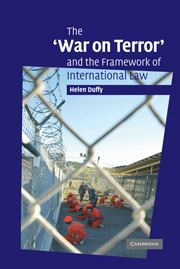2 - ‘Terrorism’ in international law
Published online by Cambridge University Press: 06 August 2009
Summary
The events of 11 September 2001 have been ubiquitously characterised, and internationally condemned, as acts of ‘international terrorism’. Their wake brought unprecedented unity of purpose on the international level as to the need to prevent, punish and otherwise combat international terrorism. A proliferation of legal measures ensued, with broad-reaching political and legal effect, including Security Council resolutions that imposed a wide range of obligations on states to prevent and suppress terrorism. These include ensuring that ‘terrorist acts are established as serious criminal offences in domestic laws and regulations and that the punishment duly reflects the seriousness of such terrorist acts’.
One could be forgiven for assuming that international terrorism is a readily accessible legal concept. But is the universal condemnation of terrorism matched by a universal understanding of what we mean by the term? Are the obligations to suppress and punish terrorism matched by an internationally accepted definition of what precisely it is that is to be penalised? Or to paraphrase the famous dictum of a US judge, do we simply know terrorism when we see it; and is that a sufficient legal basis to give rise to obligations of states and criminal responsibility of individuals?
The search for an accepted definition of terrorism in international law has been described as ‘resembl[ing] the Quest for the Holy Grail’. Various diplomatic attempts – some of which are on-going – to draft a global terrorism convention have failed as consensus around a single definition of international terrorism has proved elusive.
- Type
- Chapter
- Information
- Publisher: Cambridge University PressPrint publication year: 2005

